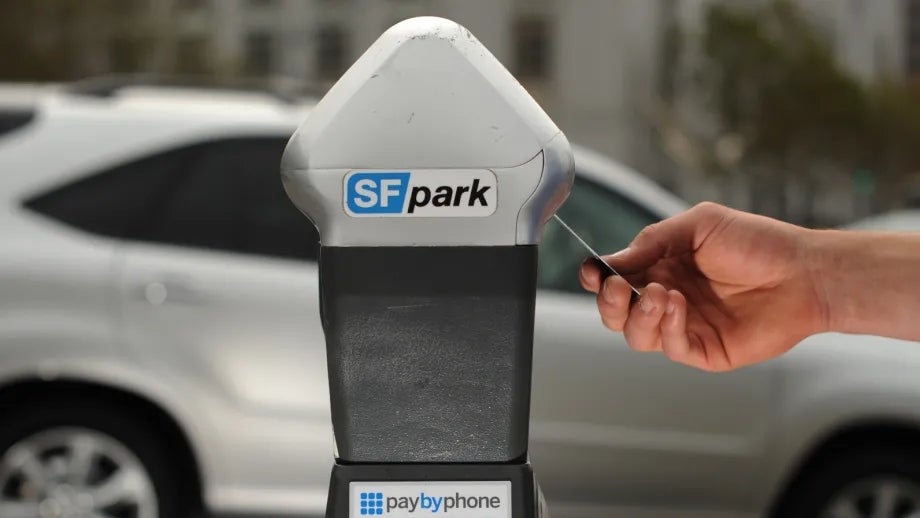MTC Awards Parking Management Grants to Reduce Greenhouse Gas Emissions
Six million dollars for six projects to reduce driving and manage the demand for parking — that is the equation approved by MTC yesterday as part of a program to cut greenhouse gas emissions.
At its regular monthly meeting, MTC allocated a total of $6 million from its new Parking Management and Transportation Demand Management Grant Program to six cities, with grants ranging from the $300,000 range to $1.5 million.
“Both the availability and cost of parking have a major impact on our travel decisions,” said MTC Spokesman Randy Rentschler. “At the same time, the uncertainty about where to park can lead to excessive circling by drivers and by extension, more greenhouse gas emissions. These grants attempt to give cities the tools to manage parking in a smart way, and give travelers the information they need to make smart decisions.”
Selected from among 20 initial applications, the winners are:
- City of Berkeley, goBerkeley Residential Shared Parking Pilot: In certain Berkeley residential neighborhoods adjacent to commercial districts, residents can secure annual permits that allow all-day parking, while nonresidents are currently limited to two-hour parking during weekday business hours. This pilot would rethink that system, making parking spots in select permitted residential parking areas available for extended periods (longer than two hours) to visitors, who would pay an hourly fee through a mobile app, phone line or website. The pricing would go up or down according to demand, to achieve a parking spot occupancy rate of 65 percent to 85 percent. The overall goal is to make better use of street parking and reduce circling for parking. $950,000 grant
- City of Hayward, Comprehensive Parking Management Plan: The project calls for Installing on-street parking meters in areas around the Hayward BART station and downtown where parking is currently unmetered, and creating a permit system to allow people who work downtown to park all day in garages without having to move their cars and circle in the middle of the day, with added parking enforcement and wayfinding so drivers know where to park. $338,000 grant
- City of Oakland, Oakland Demand-Responsive Parking and Mobility Management Initiative: This project will augment a parking management pilot program in Montclair Village and expand the program to other areas of the city, including Chinatown, Lake Merritt/Uptown and Civic Center/Old Oakland. Elements include demand-based pricing programs to achieve an optimal 85 percent occupancy rate per block; and new signage and wayfinding to communicate parking time limits and pricing. $1.3 million grant
- City of San Mateo, Downtown Parking Technology Implementation: Involves upgrading all of the parking meters in the Downtown to smart meters that have the capability to quantify and report occupancy in real time, accept credit cards and accommodate pay-by-phone technology. Smart meters will also be installed in the city’s five off-street parking facilities as well. A dynamic signage program will track occupancy in city garages by counting cars at the entrances and exits and displaying the number of available spaces on reader boards outside of garages and at key intersections. $1.5 million grant
- City of Walnut Creek, Walnut Creek Parking Guidance System Pilot: This project will establish a “Parking Guidance System,” with installation of sensors that can track occupancy at all parking spaces on city streets and in public garages in the Downtown area. Data from sensors will generate real-time information on parking availability that will be communicated to drivers through dynamic signage. $783,000 grant
- City of Sunnyvale with the Valley Transportation Authority, Peery Park Rides: This project would launch a shuttle service connecting the Sunnyvale Caltrain station to Peery Park, a 446-acre industrial business park in central Sunnyvale where older buildings are slated for redevelopment into higher density office and tech-based industrial buildings. The shuttle will make it easier for commuters to ride Caltrain to work by closing the “last-mile” gap between offices and the transit hub. At the same time, the shuttle will also serve as a flexible, on-demand local transit system connecting nearby residential neighborhoods with local employment and retail businesses. Riders will be able to summon the shuttle with a smartphone app and web interface, and technology will dynamically route the service based on real-time customer trip needs. $1,129,000 grant
Sponsors cite such benefits as increased parking availability in impacted areas, improved customer/visitor satisfaction, reduced double parking and parking search time, fewer traffic accidents, reduced circling and vehicle miles traveled, reduced congestion, fewer "cold starts" of cars (which are high in emissions), and reduced greenhouse gas emissions. Better information on parking availability combined with demand-responsive pricing will also discourage single-occupant auto travel and encourage the use of public transit. The MTC grants cover up to 85 percent of the the total project costs, with the remainder covered by other sources.
The grants stem from MTC’s Climate Initiatives Program and the associated One Bay Area Grant Program (Cycle 1), which is fueled by federal Congestion Mitigation and Air Quality funding. — Brenda Kahn
For more information, contact Stefanie Hom, shom@bayareametro.gov, 510-817-5756.


Submit your comment
In order to receive a reply to your comment, please provide an email address.